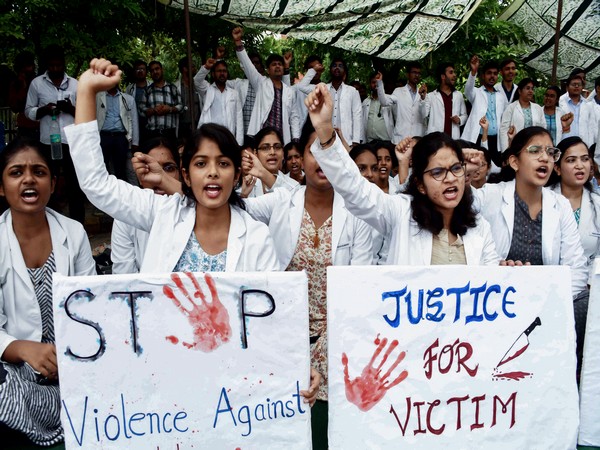
It was on the stroke of midnight, 15th August 1947, when India woke to the famous “Tryst with Destiny” speech by Pandit Jawaharlal Nehru, and, it’s the 14th night of August 2024 before the celebration of our 78th Independence Day we Indians are encountering anguish, anger and lament of women with the slogan “Reclaim the Night.” The independence brought to us still lurks in the unforgiving darkness of the nights where women encounter barbarism and apathy.
A ghoulish night befell the young doctor on her night duty, as the hands that heal, bled to death at RG Kar Medical Hospital in Kolkata, on the 9th of August 2024 setting an appalling nightfall, with the present and future chapters of independence getting far gorier.
From Matangini Hazra to Malala Yousafzai, the stoicism of being a woman will perpetually fail to be justified with any dramatic speeches thrown upon on any one single historic night.
Isn’t the horrendous blackness of each night just forcing us all to erase the ‘The Women of their Era’ Sarojini Naidu, Kamala Devi Chattopadhay, Rani Laxmi Bai and their courage and sacrifices made to free our nation from the clutches of East India Company to oblivion?
I partly feel so; because I believe we aren’t as audacious today on the eve of our Independence Day to fight for our “Freedom to be Safe in our zone.” We still fear to wear our choice of clothes. We still need our boyfriends, brothers, or husband to accompany us if it’s a night out. Even the safe circle of our own home become an abusive violent battleground for many women across the globe.
So why can’t every woman even after being astute be the revolutionaries likewise, Russian Natalya Alexandrovna Armfeldt, American Mercy Otis Warren or a crucial role player of French revolution Claire Lacombe?
Perhaps we women have forced ourselves as products of social cynicism since time immemorial. It was, it still is and, presumably, will remain so forever.
A product of a blood lineage that boasts being freedom fighters and Civil Servants, I learnt from my grandad, how my grandmother sneaked through the night to keep the flames of revolution burning with fervour, along with her fellow revolutionaries, and how they treated her with all due respect and provided safety and security.
Perhaps back then men who lived for a revolution (a cause for which we can claim ourselves free of oppression) respected every woman participating in their cause for freedom and that surely had no room for the one being lecherous. If at all, they were slayed instantly.
Back in the days of India East Pakistan partition, they were those revolutionary friends which included revolutionary poet Jibanando Das and many more comrades who ensured a safe relocation of my Grandmother, her cousins and my father (who was still breastfed) to Kolkata safely from Barisal via Dhaka.
I feel gratified as a woman who hails from that bloodline recollecting those tales of nerve and interdependence.
But the same woman in me always remains apprehensive over the abhorrent act, and, it gives me goosebumps if, at all, I think of taking a stroll at night around whichever city I visit. It’s not the ghouls, but that pure form of human having the prowess of monsters.
The RG Kar rape and murder case of a 31 year old doctor – Tilottama – changed the face of the city of my origin. City of Joy. Really? The City of Joy?
On the 29th in the month of June this year, when India won its T20 World Cup, I with my family excitingly witnessed the pompous hysteria around the streets of Park Street after a hearty meal at Mocambo.
The spirited crowd celebrating the victory swayed every soul in the city to their agile trance. The spectacle, that night, came to me without a wonder as I have always seen and known Kolkata as it had draped itself that night.
But my teenage son standing on the pedestrian path beheld it for the first time, and, on his annual fifteen days visit to India, was yet to digest the frenzy around him. We forced him to join the crowd, which he timidly agreed upon and was delighted to see the welcome he received to join the roar of triumph. Each year his two weeks holiday in Kolkata revolves around good and authentic Bengali cuisine and multiple visits to the famous ‘Boi Para’ (the Boulevard of Books) College Street, but this year offered him the bonus of watching the true face of what we always call ‘The City of Joy;’ and he readily agreed upon.
The city known for its harmonious celebrations, be it sports (cricket, football, Olympic) or any form of religious festivities throughout the year; can it nurture malaise in its womb?
When asked about the recent violent incident with a lady doctor, his shocking prompt reply was, “I don’t know what to say. When will the culprit be punished?” His expression of ‘Shame Shame’ was apparent in his bright flickering eyes. Back home in Kolkata two of his friends (both a year junior to him) one boy and the other a girl vehemently protested through the streets of Kolkata on the 14th night of 2024. Fifteen-year-old Pupai from South Kolkata who aspires to be a doctor is now petrified, and Sanku who is also fifteen years old, joined the procession with his mother wondering why it happened and how to heal the world.
“Reclaim the Night” dates back to 1975 in Philadelphia when Susan Alexander was murdered on her way back home from work, followed by the movement in Leeds in 1977 in response to “Yorkshire Ripper” murders, rape and violence. Every passing year since then has seen such movements against women’s atrocities.
But today, a question remains: How many more “Reclaim the Night” lay in the queue?
(Swati Basu Das is a freelance writer based in Oman.)